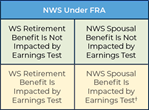The decision of when to begin taking Social Security benefits is one of the most important questions for many retirees. Unfortunately, thanks to the maze of Social Security rules individuals must navigate, it is often also one of the most complex. And while many retirees are aware that claiming Social Security benefits “early” can lead to a reduced benefit, research has shown that fewer individuals understand the Earnings Test rules that can also impact benefits when a young (pre-Full-Retirement Age) worker decides to claim benefits while also still working.
Under the Earnings Test rules, if an individual is under their Full Retirement Age for all of 2019, then Social Security will withhold $1 of benefits for every $2 of earnings over the annual $17,640 limit. Similarly, if an individual reaches their Full Retirement Age in 2019, then the annual Earnings Limit threshold is increased to $46,920, and Social Security will withhold “only” $1 of benefits for every $3 of earnings over that amount. And notably, only earnings attributable to work performed before an individual reaches their Full Retirement Age counts toward that total.
When benefits are withheld due to the Earnings Test, the Social Security Administration will withhold such benefits starting at the beginning of each year (or immediately when benefits begin midyear) and continue to not pay benefits every month until the full amount has been withheld. Furthermore, Social Security does not pay partial benefits for any month, so for those impacted by the Earnings Test, no benefits are paid until a full month’s Social Security check can be paid.
Individuals who retire midyear often benefit from special “Grace Year” rules, which apply in the first year in which an individual is entitled to a Social Security benefit and earns less than the “monthly limit” in at least one month. Under these rules, an individual is entitled to receive an unreduced-by-the-Earnings-Test benefit for any month in which they did not earn more than the monthly limit. The monthly limit is 1/12 the annual limit.
Notably though, while the Earnings Limit can reduce (or even eliminate entirely) a pre-Full-Retirement-Age worker’s monthly benefit, no similar restrictions apply to other types of income. Thus, a young Social Security recipient can have substantial retirement distributions, portfolio income, and/or other non-earned-income without having any benefits withheld due to the Earnings Test.
It’s also important to note that the Earnings Test impacts different types of Social Security benefits differently. An individual’s retirement benefit or survivor’s benefit, for instance, is only impacted by the Earnings Test based on that individual’s own earnings. By contrast, spousal benefits can be “hit” with the Earnings Test if either the spouse receiving the benefit is young and working, or if the spouse on whose earnings record the benefit is being paid is young and working!
Thankfully though, benefits “lost” to the Earnings Test aren’t generally lost forever. Instead, when an individual reaches Full Retirement Age, the Social Security Administration will recalculate the individual’s Earnings-Test-reduced-benefit, reducing the actuarial reduction for claiming early by the number of months in which no benefits were received due to the Earnings Test.
There are, however, some situations in which benefits withheld by the Earnings Test truly are lost forever. Such scenarios include situations in which a Social Security recipient does not live long enough to reap the benefits of an actuarial reduction, and those where an individual who is already past their Full Retirement Age is eligible for spousal benefits, but has spousal benefits withheld due to a younger working spouse’s earnings.





 Welcome back to the 125th episode of Financial Advisor Success Podcast!
Welcome back to the 125th episode of Financial Advisor Success Podcast!




